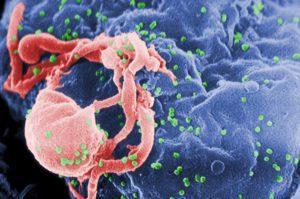
T cell (red) infected with HIV particles (yellow) (Public Health Image Library, CDC, Image ID:10000)
Although most HIV vaccine research focuses on eliciting antibody response, T cells should not be forgotten. An HIV vaccine eliciting T cells to conserved HIV epitopes may be sufficient in protecting individuals from HIV infection as presented by Josephine Cox at the HIV Research for Prevention Conference.
CD8 T cells have been shown to control acute HIV infection and they are the reason behind the ability “elite controllers” have to control the virus. The role of CD8 T cells in HIV control has been shown widely in both non-human primate models and in human studies. An effective HIV vaccine may need to target conserved sites present in most HIV strains. CD8 T cells are able to recognize these highly conserved, functional epitopes. This brought about the study presented by Dr Cox; looking at the use of a T cell based HIV vaccine.
The vaccine Dr Cox described has 14 functionally conserved sites of HIV. They tested this vaccine on 72 volunteer from Nairobi, Kenya and found that the vaccine was well tolerated with no safety concerns. 100% of the volunteers had T cells induced by vaccination that recognized regions of HIV. These T cells recognized multiple conserved peptide pools in Gag, Pol, Vif and Env.
They further characterized the T cells and found that the vaccine-elicited CD8 and CD4 T cells were polyfunctional– with the CD4 cells possessing more polyfunctionality than the CD8 T cells. Using viral inhibition assays with participant samples they found that the vaccinees’ CD8 T cells displayed broad HIV inhibition one week after the last vaccination.
These results show that a T cell based vaccine has strong immunogenicity and no safety concerns. Further studies including efficacy studies should be performed in the future. A T cell based vaccine is a promising goal and research in the vaccine field may need to focus on this aspect more.
Presentation webcast: HIV Research for Prevention 2016 webcasts
Article by Thandeka Moyo











